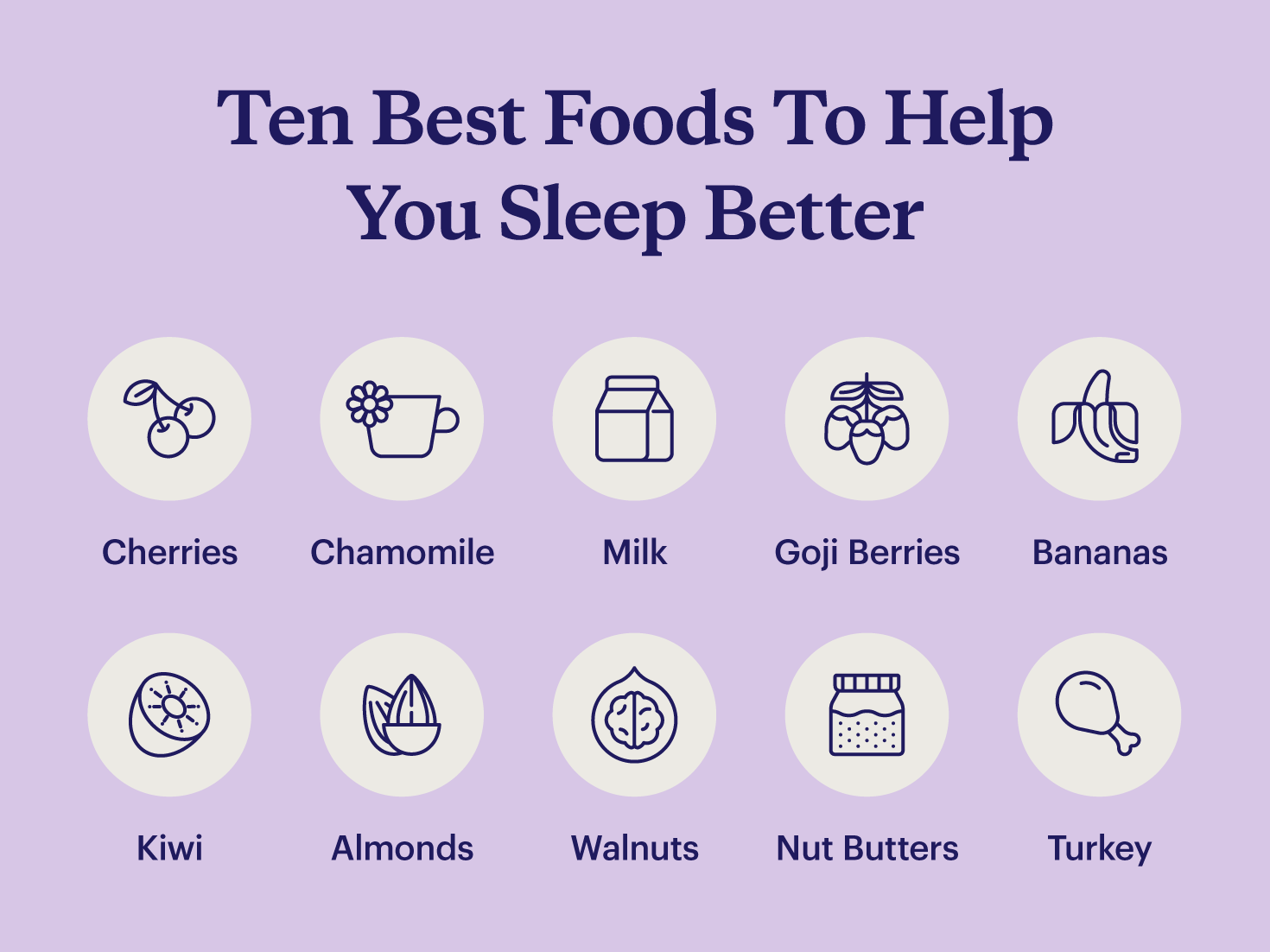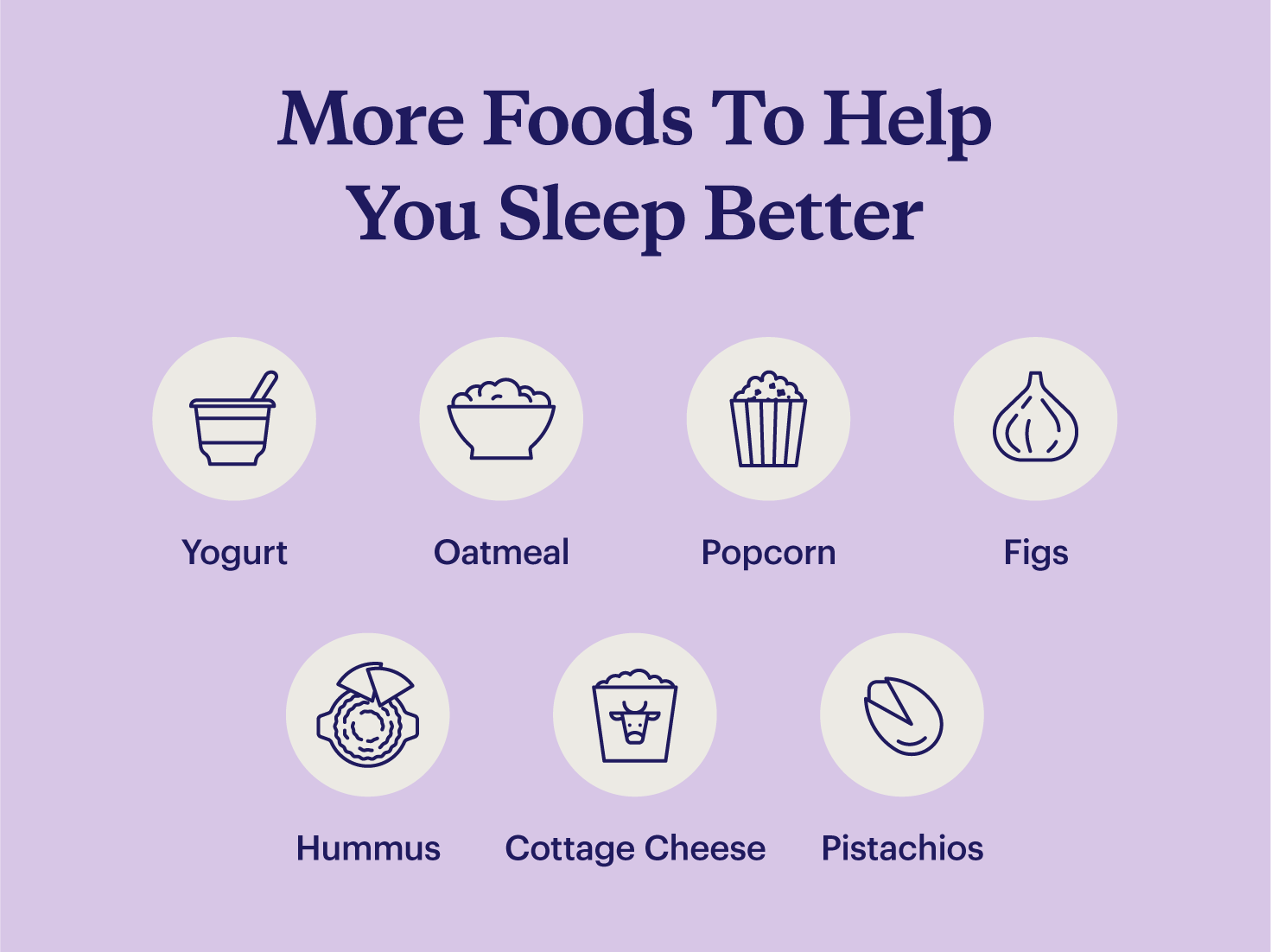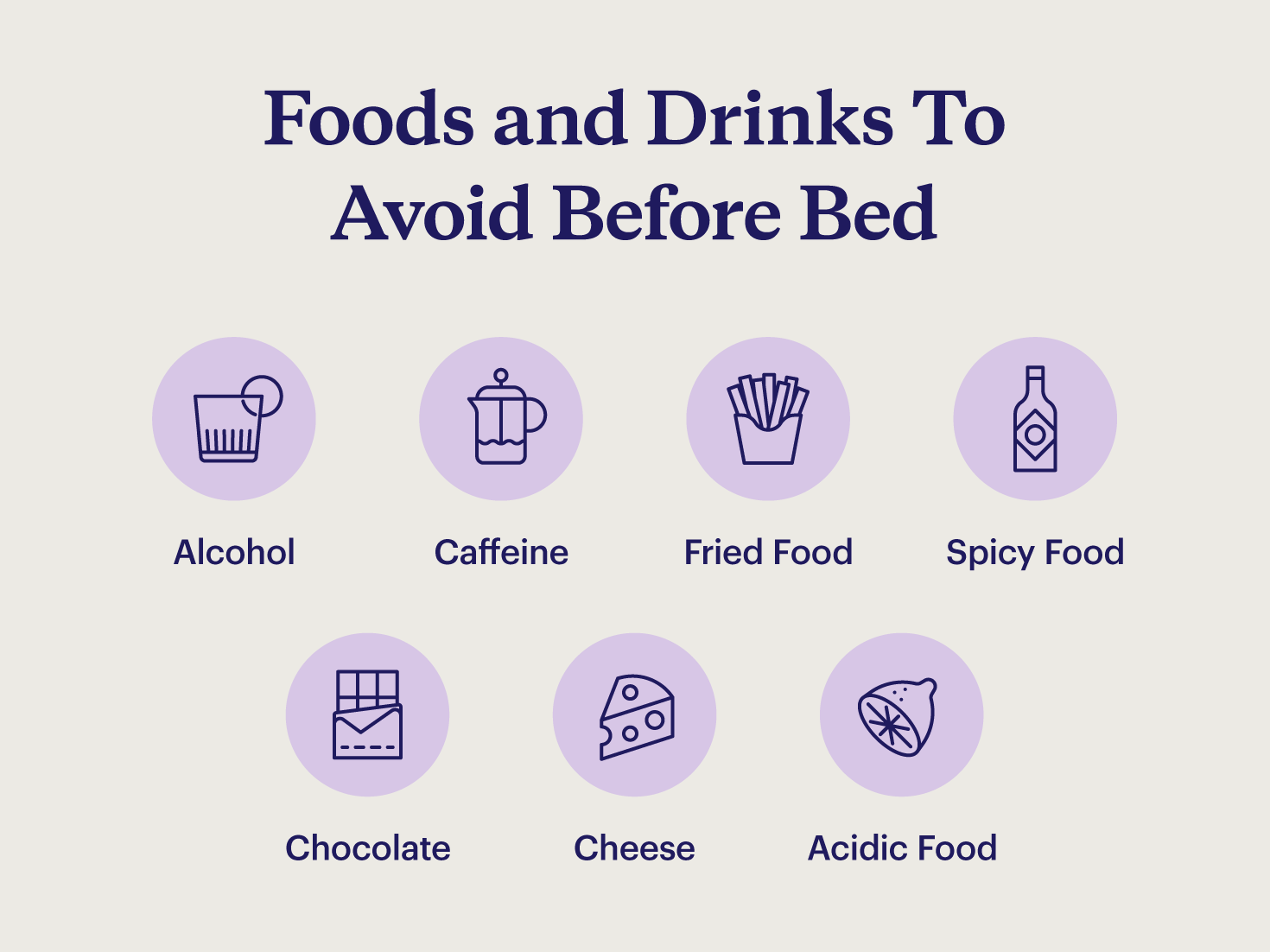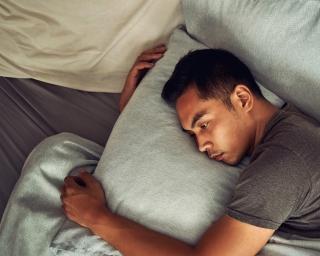What To Eat Before Bed (19 Foods To Try + 7 To Avoid)
Key Takeaways
- Some of the best foods to eat before bed include cherries, bananas, kiwis, and almonds.
- Foods to avoid before bed include alcohol, caffeine, and fried, spicy, or acidic foods.
- Generally, the best practice is to have a small, easily digestible snack 2-3 hours before bedtime.
Do you wake up feeling unrested, no matter how much sleep you feel like you’re getting? Approximately 30% of adults have symptoms of insomnia, struggling to fall and stay asleep.¹
Knowing what to eat before bed may be the simple solution to your nighttime woes. “The nutrients we get from food serve as the building blocks for other minerals and proteins needed to create amino acids involved in sleep," says sleep expert Dr. Ana Krieger.²
Learn how to sleep better by understanding what foods contribute to quality, restorative sleep.
Best Foods To Eat At Night
When deciding what to eat before bed, it’s important to consider your specific needs. For example, foods with melatonin, such as cherries, may help you sleep better, but they may not be suitable for people who struggle with digestive health issues as they’re high in fiber.³
Melatonin is a hormone that we produce in our bodies, and it's linked to our sleep cycle. Evidence has shown that taking melatonin supplements can help improve circadian rhythms and combat insomnia.
The best foods for a good night's sleep will help you fall asleep fast and stay asleep throughout the night. While not all of these foods will suit everyone’s specific needs, here are some foods that have been known to help improve sleep quality.
1. Cherries
Social media has been full of influencers sharing their preferred “sleepy girl mocktail” recipe, which features tart cherry juice, magnesium powder, and prebiotic soda. But, is tart cherry juice the best juice to drink at night?
In short, yes. Research has found that drinking tart cherry juice for sleep can raise one's melatonin levels and lead to better sleep efficiency and improved sleep quality overall.⁴
2. Chamomile
Looking for tea that helps you sleep? Chamomile tea is a tried and tested method to fix your sleep schedule. With its mellowing effect, it’s been used for centuries to calm nerves and settle an upset stomach.
Chamomile is known to have many positive effects because of its immune-boosting flavonoids. These plant compounds have numerous benefits, such as⁵:
- Reduced inflammation
- Decreased risk of certain cardiovascular diseases
- Improved brain function
- Anti-carcinogenic properties
Having tea is a good way to drink more water, though around 20% of most people's water consumption can be attributed to water-rich foods. Just be careful not to drink too much water before bed or you may wake up in the middle of the night to use the bathroom.
3. Milk
Surely, you've heard of people having a glass of warm milk before bed. This works because milk contains both tryptophan and calcium, which we know by now are excellent at promoting deep sleep.
Tryptophan is an amino acid that helps the body biosynthesize proteins and release serotonin and melatonin. You may be most familiar with tryptophan as the chemical in turkey meat that makes people sleepy after their big holiday meal.
4. Goji Berries
A 2016 study found that rats who consumed goji berries had reduced symptoms of depression and anxiety.⁶ In humans, goji berry juice can boost one's mood, aid in relaxation, and improve sleep time.
These little berries are one of the best fruits to eat at night, as they are a natural source of both melatonin and antioxidants, which can help combat stress. These relaxing qualities can, in turn, help improve sleep.
5. Bananas
Aside from containing potassium and magnesium, which allow your muscles to relax, bananas are also rich in the amino acid tryptophan. With its serotonin-producing signals⁷, this compound helps you to feel more relaxed and ready for bed — which makes a banana before bed just what the doctor ordered.
6. Kiwi
A study found that participants who ate kiwifruit an hour before bedtime fell asleep 42% more quickly than those who ate nothing.⁸ This is believed to be due to the fruit's high serotonin content. One of the other benefits of eating kiwi at night is that it also contains folate, which is said to prevent sleep disorders like insomnia.
7. Almonds
Overall, almonds are nutritionally dense, making them a great bedtime snack. Naturally high in melatonin, almonds can help signal to your body that it’s time to prepare for sleep.⁹
Additionally, they contain magnesium, a mineral that promotes relaxation and can improve sleep quality. They’re also a good source of protein, which can help stabilize blood sugar and prevent nighttime restlessness caused by hunger. Their healthy fats also leave you feeling full for longer, reducing the need for a midnight snack.
8. Walnuts
If you're a late-night snacker, ditch the chips and grab a handful of walnuts instead. This nut is more than just a great source of melatonin; it's also rich in heart-healthy omega-3 fatty acids, which can help reduce inflammation and promote relaxation. Like almonds, they also provide protein and healthy fats, contributing to satiety and stable blood sugar levels.
9. Nut Butters
Nuts are generally high in tryptophan and fats, making them a perfect sleepy-time snack. In nut butter form, combined with something like toast, they’re a satisfying snack full of sleep-inducing carbs. So, while eating peanuts at night might make you feel like a circus elephant, it’s actually a great bedtime treat.
10. Turkey
As mentioned, turkey contains tryptophan, an amino acid that can cause drowsiness. But, that’s not the only reason that turkey can contribute to a good night’s sleep — or an excellent post-dinner nap.
Turkey dinners are usually quite carb-heavy, paired with sides like mashed potatoes, stuffing, and sweet potato casserole. These foods are rich in carbohydrates and fats and paired with an often socially heavy dinner around the holidays, making turkey dinner a good sleep aid.
11. Yogurt
Yogurt is another healthy source of tryptophan. Additionally, yogurt is a good source of protein, calcium, and probiotics, all of which can ensure fullness, promoting relaxation and a night of healthy sleep.
When having yogurt at night, ditch the sugary, flavored ones and opt for a cup of plain yogurt instead. Better yet, go for Greek yogurt, which is higher in protein and lower in fat and carbs.
12. Cottage Cheese
Tired of yogurt? Change things up with a cup of tryptophan and casein-rich cottage cheese. Casein protein is a slow-releasing milk protein that staves off hunger. A cup of cottage cheese is a healthy snack that can help you get uninterrupted sleep at night.
13. Oatmeal
There's just something calming about a warm bowl of oatmeal. Consuming oatmeal before bed can have a soothing effect on the body and mind. Perhaps it's the high levels of tryptophan and B vitamins!
Oatmeal is a complex carbohydrate that can help regulate blood sugar levels, preventing spikes and crashes that can disrupt sleep. Additionally, oatmeal can be a good source of magnesium, which promotes relaxation and can improve sleep quality.
14. Hummus
Hummus is made with chickpeas, a natural source of all those sleep-inducing vitamins and minerals, including tryptophan and vitamin B6. This high-fat, tasty snack is also often paired with carbohydrates like pita or pretzels, leaving you full longer, which encourages a restful sleep.
15. Popcorn
It's time to stop feeling guilty about winding down with Netflix and a tub of popcorn. This complex carb can help you feel sleepy faster. Just keep it plain because adding a lot of butter, salt, or other toppings can be counterintuitive. Excessive salt can disrupt sleep, while excessive fat can lead to indigestion.
Consider air-popped rather than microwave popcorn. It is a whole grain and rich in fiber, which can help regulate digestion and promote fullness. So, a small bowl of air-popped popcorn can be a satisfying and healthy bedtime snack. Just be mindful of the toppings and portion size.
16. Pistachios
Pistachios are rich in melatonin, vitamin B6, and magnesium — all of which are essential foods for better, deeper sleep. Like other nuts, pistachios are also packed full of protein and healthy fats, providing a filling nighttime snack that is both delicious and effective for improving your sleep quality.
17. Figs
Figs are another potassium and magnesium-rich food. These minerals, along with calcium and iron, encourage blood flow and keep your muscles from contracting — making it easier for you to fall asleep. Figs are also great if you crave sweets at night. They’re naturally sweet, without any added sugar, which won’t spike blood sugar, ensuring a restful night’s sleep.
18. Spinach
Here's another food that insomniacs should load up on. Spinach is rich in various minerals and supplements including folate, magnesium, tryptophan, and vitamin B.
Pair your spinach with another item from this list, such as kiwi in a smoothie or cottage cheese in an omelet, to make a satisfying sleepy-time snack that will keep you full and well-rested.
19. Kale
A cup of chopped kale before bed will get you 10% RDI of vitamin B6, making it one of the best foods for sleep. Vitamin B6 helps our bodies produce more serotonin and melatonin! Pair it with carb and fat-rich foods to keep yourself satiated and asleep for longer.
7 Foods To Avoid Before Bedtime
We’ve looked at the foods that can benefit you at bedtime, but you may also be curious about why you shouldn’t eat before bed. While adding a nutritious snack to your bedtime routine can promote better sleep, eating a large meal or something that is too fatty or acidic, for example, will actually negatively impact your body’s ability to sleep.
Eating too close to bedtime can lead to heartburn and indigestion¹⁰, which is caused by lying down too soon after eating. Stomach acid more easily flows back up into the esophagus, creating discomfort and making it difficult to fall asleep.
Additionally, going to sleep too soon after eating means your body hasn’t had time to digest the food fully. This can cause interruptions to your sleep, as well as contribute to weight gain.¹¹ To improve your sleep quality and overall health, avoiding large meals and heavy snacks in the hours leading up to bedtime is best.
While eating the following foods may not cause sleepwalking or other sleep disorders, they can still disrupt your sleep cycle. Here are some of the worst foods to eat before bed.
1. Alcohol
Some people may swear by a glass of wine before bed or even feel like they need a drink to sleep. And, yes, alcohol does have a relaxing effect, but this isn't necessarily a good thing around bedtime. When your throat muscles and tissues are too relaxed, you can end up snoring louder or even suffering from sleep apnea.
Alcohol can also impact your sleep cycle. While you may fall asleep more easily, it can lead to fragmented and poor-quality sleep. It can reduce the amount of deep, restorative sleep you get, leaving you feeling groggy and unrefreshed in the morning.
Additionally, alcohol can increase the frequency of nighttime awakenings, making it harder to fall back asleep. If you want to learn more about alcohol and sleep, read our sleep health during recovery guide.
2. Caffeine
Consuming caffeine too close to bedtime can interfere with your body's natural sleep-wake cycle, making it harder to fall and stay asleep. Even moderate amounts of caffeine can lead to sleep disturbances, including difficulty falling asleep and reduced sleep quality. For a restful night's sleep, it's best to avoid caffeine in the late afternoon and evening.
3. Fried Food
The high fat content in fried foods can lead to indigestion and heartburn¹⁰, which can keep you awake at night. They can also affect your blood sugar levels and slow down digestion. Uncontrolled glucose levels can lead to sleeping difficulties.
4. Spicy Food
Spicy foods are among the worst foods to consume late at night, as the capsaicin in them can cause heartburn, indigestion, and acid reflux, which can lead to discomfort and difficulty falling asleep.¹⁰ It's best to avoid spicy foods, especially in the evening, to ensure a restful night's sleep.
5. Acidic Food
If you’re wondering whether you can eat oranges at night or other similarly acidic foods, it’s best to avoid them. Acidic foods like oranges and grapefruits can trigger heartburn and acid reflux, which can keep you up all night.¹⁰
6. Chocolate
This is a tough one for those with a sweet tooth. Chocolate tends to have a lot of sugar and caffeine, two things we know are terrible for sleep.
While caffeine is a stimulant to keep you awake, sugar can cause blood sugar spikes and crashes, leading to restlessness and difficulty falling asleep. Avoid chocolate later in the evening and opt for some of the sweet foods on this list, such as kiwi or figs.
7. Cheese
Foods high in tyramine, such as aged cheeses, cured meats, and fermented foods, can disrupt sleep patterns in some individuals. Tyramine is an amino acid that can elevate blood pressure and trigger headaches, which can interfere with sleep.
While the effects of tyramine on sleep are not fully understood, it's advisable to limit the consumption of tyramine-rich foods, especially in the evening, to minimize potential sleep disturbances.
Don’t Sleep On Nutrition
What you eat doesn't just affect how you feel throughout the day, it can also keep you from tossing and turning late at night. Minding your diet won’t necessarily prevent you from having a nightmare or recurring dream, but it may help you get more restorative sleep. When deciding what to eat before bed, choose foods that are high in those sleep-inducing vitamins, minerals, and nutrients, and you're all set for some sweet dreams.
And if you're still having trouble catching some zzz's, consider some of the most recent technology that can help you sleep.
FAQ
You shouldn’t eat a large meal before bed, as it can cause indigestion¹⁰, interfere with the body's natural sleep-wake cycle, and potentially contribute to weight gain. But, a small, light snack can benefit some people, as long as it's not too close to bedtime and doesn't contain stimulating substances like caffeine or added sugar.
A small, light snack can be helpful if you're hungry, especially if you can’t sleep. However, it's important to ensure that the snack doesn't disrupt your sleep cycle. It should be easily digestible and not contain any caffeine or added sugar.
Aim to stop eating at least 2-3 hours before bedtime. This gives your body time to digest food and prepare for sleep.10 Experiment to find what works best for you and your individual needs.
Eating late at night can disrupt your sleep by causing indigestion¹⁰, interfering with your body's natural sleep-wake cycle, and potentially contributing to weight gain. This can lead to poor sleep quality and daytime fatigue.
There’s no one-size-fits-all answer. The food should be a small snack without caffeine or excessive sugar, and one that your body can digest easily. Consider a handful of nuts, some yogurt, or a piece of fruit like a kiwi.
No, but some fruits are better than others. Avoid highly acidic fruits, such as oranges, as they are more likely to cause indigestion, which can disrupt sleep.¹⁰ Fruits, such as kiwi, figs, and goji berries are good alternatives that promote healthy sleep.
More To Explore
Level up your sleep routine with our most-loved products.













